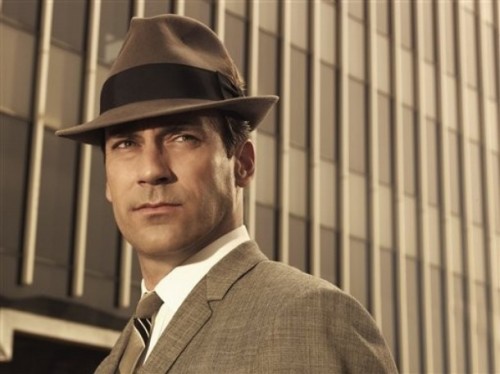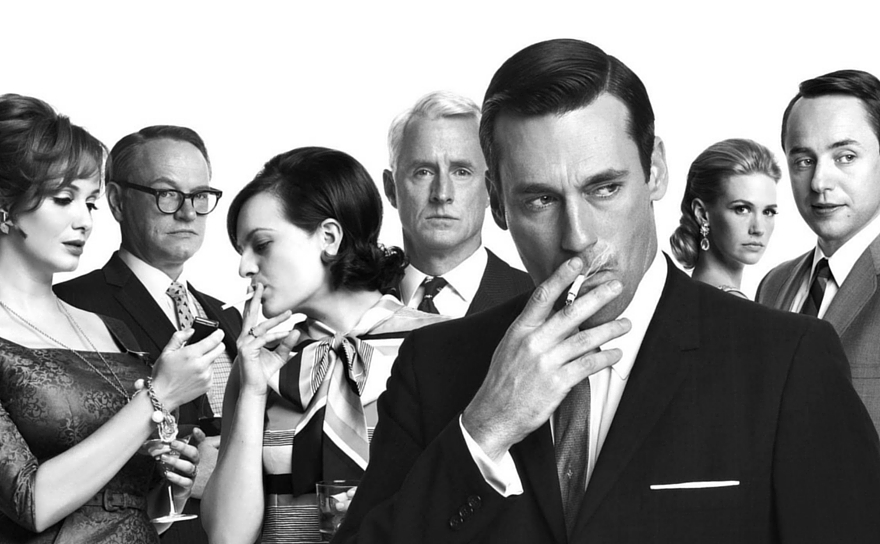Season 5 of Mad Men has many recurring themes, but the one I think is most interesting is: What happens when your actions catch up with you?” This theme is a great addition to another recurring Mad Men theme, “What happens when success isn’t enough?”
This is what I call the epitome of #whitepeopleproblems. It’s not the problems that come from having too little. It’s the problems that come from having too much. (For incredible commentary by the cast and creator Matt Weiner, here’s the link to AMC’s website.)

Don Draper should get a Lifetime Achievement Award in the “Broken Man, Haunted Past” category because he just makes it look so good.
Season 5 of Mad Men concludes with an iconic outro of Don strutting into a bar smoking a cigarette, the embodiment of mysterious cool. A beautiful, young woman approaches him almost instantly to ask if he’s alone. Don Draper looks up from his drink with a witheringly sexy look, and then the show ends.
What would Don Draper do? We’ll find out next season, but there’s an excitement that the old Don is back, even though the old Don is a womanizing, alcoholic megalomaniac. But he is, undeniably, the womanizing, alcoholic megalomaniac every woman wants to love and every man wants to be.
It is a montage of the old Don Draper, the characterization of which has been conspiculously absent in Season 5 and gets fans of the show’s pulses racing. When discussing this current season with my brother via text message, he wrote, “Why is Don so lame now?” A question many Mad Men fans have been asking themselves.
This season, Don is a newlywed again when he marries his office sweetheart, Megan. Don has been notoriously distracted in Season 5 because he’s been happy in his new marriage to Megan. But as his marriage to his beautiful but free-spirited young wife starts to crack, Don starts to gravitate back to his “old-fashioned” ways: Ordering old fashions and looking cool in bars while (not even trying to) pick up women.
Happy Don doesn’t have his edge, but Happy Don is doomed to be short lived. While Don thought he was doing good by being transparent about his dark past with Megan, unlike in his marriage to Betty, he still hasn’t really dealt with it. Deep down Don is sabotaging himself. His inability to deal with his dark past and disregard for others emotions is what made him cool. It lit the fire, especially creatively for him. It’s why Mad Men fans fell in love with him. He is, for most people, the guy they’ll never have, or the guy they’ll never be.
Spoiler alert: Lane Pryce, the loyal yet foppish British office manager at Sterling, Cooper, Draper, Price hangs himself in his office in the second to last episode of Season 5. Don feels an immense amount of guilt because deep down he fears that Lane’s extreme actions are the result of Don demanding Lane’s resignation after Lane embezzles money from the company. Meanwhile, Lane’s death parallels the death of Don’s brother Adam, who also hanged himself.
Lane’s death stirs up old emotions, and they manifest themselves in spectacularly creepy ways. Don goes to see the dentist after a rotting tooth puts him in agonizing pain. While under the gas, Don as a hallucination he’s talking to Adam. Don pleads to his deceased brother, “Don’t leave me.” The ghost of Adam responds mockingly, “Don’t worry, I’ll hang around.”
This exchange is cruelly ironic and exemplifies Don’s fear of abandonment. All Adam wanted was a brother, and Don denied him because Adam was too much of a reminder of his past. It’s ironic that Don fears being abandoned by his brother, when that’s exactly what Don did to Adam.
Adam says to Don, “It’s not your tooth that’s rotten.” Don’s father was kicked in the face by a horse that was spooked during an electrical storm, which probably explains Don’s recurring problems with his teeth. It is a physical manifestation of Don’s haunted past.
Switching gears, let’s talk about Pete Campbell. Pete is one of my least favorite characters because he’s a ladder-climbing wiener, but I think it’s interesting that Season 5 has his life paralleling Don’s life in Season 1. The themes of getting older, missing your youth, and not being happy with your prizes after you’ve won them are apparent.

Pete Campbell and Rory from Gilmore Girls.
One of the most dramatic scenes is Pete’s confession to his adulteress. His words affirm what the audience has been suspecting all season: Pete’s becoming Don, a man he both respects and despises.
When his adulteress asks Pete why he had the affair, he answers in a particularly weary monologue:
“All the regular reasons I guess. He needed to blow off some steam. He needed adventure. He needed to feel handsome again. He needed to feel that he knew something. That all this aging was worth something, because he knew things young people didn’t know yet. He probably thought it would be like having a few tall drinks and feel very, very good, then go back to his life and say, ‘That was nice.’ When it went away, he was heart broken. And then he realized that everything he had was not right, either. And that is why it happened at all. And that his life with his family was some temporary bandage on a permanent wound.”
Pete’s confused because he did everything Don did, but has no idea how unhappy Don was as a self-involved, alcoholic adulterer. It is the classic case of comparing others outsides with your insides. Don seemed so good at it, but all the while he was crushingly unhappy. Now Pete knows what it feels like.
Earlier this season, several of the partners visit a brothel. In the ride home, Don, who didn’t partake in any of the illicit activities, gives Pete a hard time. Pete, naturally, calls Don a hypocrite. Don says, “Had I married this one [Megan] the first time around, I wouldn’t have done all those things.” Now as his marriage to Megan starts to show signs of wear and tear, glimpses of the “Old Don” are starting to come back.
The take-a-way? Success is stifling. Be careful what you wish for, because everything you’ve ever wanted is not what you actually want. A house in the country. The spouse and the babies. The success in a high profile job. None of it will make you happy, as your responsibilities slowly form a cage which will eventually smother you.
And that is the epitome of #whitepeopleproblems: The depression that comes when too much is never enough. I can’t wait for some more answers in Season 6.







Leave a Comment